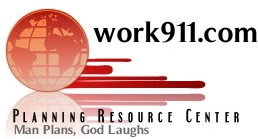Top Seven Questions for Starting Projects More Effectively
By Kevin
Eikenberry
Editor's Summary: Seven great questions for you to ask and answer to help you plan your project thoroughly. The answers you provide will allow you to understand your resource needs and potential risks. Good project planning means project success. See how when you read this article.
We all are project managers. Some of us manage projects like vacations or reunions, while others run implementations of new software systems, consolidation divisions of companies, launch new products, or build buildings. While the scale changes for different kinds of projects, and complexity changes as more people are affected and involved; at the core there are questions you can answer to help get any project off to a better start.
Here are seven of those questions you should ask (and answer!) when initiating a project:
1. What can I do at this early stage to increase the likelihood of project success? This question gets you thinking about the key things to do now. Often at the beginning, especially of big projects, people focus all their effort on planning. While planning is certainly important, sometimes there are actions other than “to plan” that need to be done early.
2. What skills will I need to complete this project, and who are the right people for the team? Seldom can we do it alone – and on big projects this question will get asked several times during the course of the project. Getting the right people with the right skills on your team is critical and needs to be done as soon as you can.
3. How do I influence and persuade these people to be committed to this project? It is one thing to identify the people you want on your team. It is another to help them understand why you want them, the roles they can play, and influence them to choose to be involved when they have other competing interests and opportunities. Even in a corporate setting where people can be placed on or assigned to a team, we need to think about how we will gain their commitment, involvement and passion in the project outcomes.
4. What are the major deliverables for this project? A key part of any project plan is to outline what the outcomes will be. Answering this question is a critical part of your project planning, and sometimes overlooked as people focus only on the final end results, not considering the major deliverables along the way.
5. What are the major steps in my project plan? Actually that is the question you want to answer, but isn’t where you want to start. Start by brainstorming on – “what are all the things that will need to be done in this project?” Don’t worry that you won’t think of all of them – you’ll think of more later! Get down on paper everything that you can think of first, and then ask the second question – “what are the major steps?” From your big list you will be able to identify the key steps and then group the other steps “inside” the major steps.
6. How detailed does my plan need to be at this stage? Think about the complexity of the project, the number of people involved and the skill and experience of those people. All of these factors (and potentially many more) can play into the decision of how detailed to make your plan. Make your plan detailed enough that people are clear on the deliverables and know what is expected of them by when. Perhaps the plan will need greater detail later and you will leave that to team members responsible for those components or maybe you need to develop that detail up front. This is one of the things you should be considering and balancing at the start of the project.
7. What can I do at this early stage to ensure fewer risks and obstacles during the course of the project? Think about the end of the project for a few minutes. Imagine today what obstacles, stumbling points and hurdles have had to be beaten to get to this successful completion. Then step back and ask yourself how you can eliminate the obstacles, bridge the roadblocks, and clear the hurdles now. This is one of the best uses of your time at the start – to take steps to reduce or eliminate these things, before they can occur to stall or delay your project.
Kevin is Chief Potential Officer of The Kevin Eikenberry Group (http://KevinEikenberry.com), a learning consulting company that helps Clients reach their potential through a variety of training, consulting and speaking services. Kevin publishes Unleash Your Potential, a free weekly ezine designed to provide ideas, tools, techniques and inspiration to enhance your professional skills. Go to http://www.kevineikenberry.com/uypw/index.asp to learn more and subscribe.
